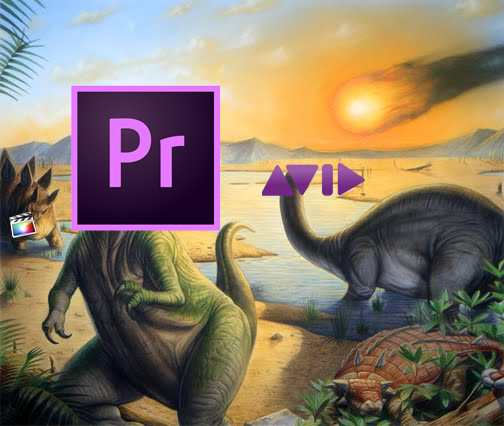The Extinction of the Video Editor
I attended a video editor lounge last Friday, hosted by Keycode Media, for a talk of all things editing. It was a great event, and I’m not just saying that because of the free beer and quesadillas. The panel made quite a few revelations over the night. Some highlights include:
- The average salary for a video editor has stayed roughly the same since the 90’s. So with inflation, editors are actually making less money.
- Avid is stagnating – its stock is down, it seems to be out of innovations, and things aren’t looking good. This year, the audience was split 50/50 between Avid and Premiere. As of only three years ago only a handful were Premiere users.
- The career path of assistant editor to editor is broken. Before, an assistant editor would sit in the same room and learn from the editor. Now, a ton of assistants are crammed in a separate room, slaving away, and the editor is off by himself.
- 4K is no longer “on its way.” It’s 100% officially here. So long HD!
But of all these interesting tidbits, none was a fascinating to me as the possibility that one day, video editors may be all but obsolete. Let me break it down for you.
Facial Recognition
The first thing an editor has to do is , pour through dozens or hundreds of takes. But not in the future. Two pieces of technology will render this step obsolete. Facial recognition software (you’ve already seen it on Facebook) will be able to detect who is in the scene and voice recognition software will be able to detect what the actors are saying. All you need to do is feed the software a script and it will be able to look through and organize the footage for you, ready to go.
It should be noted, the facial and voice recognition plugins for editing software, according to the panel, already exist.
Rise of the A.I. Video Editor
But even that isn’t the scary part. Here’s the scary part. In decades past, programmers have tried to create programs that can do all the editing for us. They tried entering in hundreds upon hundreds of rules to a computer on how a scene should be cut together, when a close-up is desired over a wide master shot, when we should see who is talking or when it’s more important to see the reaction of the listener. The results weren’t that great.
Now, however, with the emergence of A.I., programmers are able to simply show software hundreds upon hundreds of existing movie scenes and the A.I. can figure out the rules of editing all by itself!
Therefore, you can give the software the raw footage and the script, it will recognize what each piece of footage is (thanks to the face/voice recognition software), and it has the rules to understand how to cut scenes effectively, how to hit emotional beats, and keep the scene moving.
An A.I., none other than Watson itself, has already watched a movie and helped editors cut together a trailer by telling them the scene segments that should be used. Crazy!
There was one sweeter note given at the end of this A.I. talk – while A.I. can basically learn any job that you can pick up in around five days (like editing), the one area that will be a while longer for it to figure out is…pure creativity. So screenwriters, breathe a sigh of relief. We’ll need you for a while longer.
